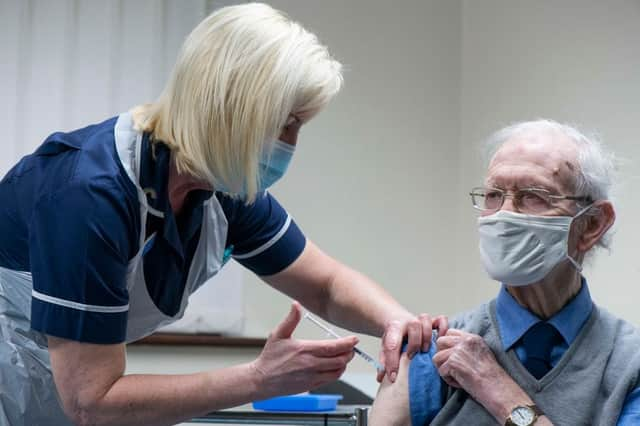Covid vaccine manufacturers say second doses should not be delayed - the science explained


Pfizer and BioNTech, the companies behind the first Covid-19 vaccine to be approved for use in the UK, have warned against delaying the second dose.
This comes after the UK government recently announced that it would be prioritising administering a first dose of either the Pfizer/BioNTech or Oxford/AstraZeneca vaccine to as many people as possible, rather than holding back injections to give second doses to those who had already received the first.
Advertisement
Hide AdAdvertisement
Hide AdIt was proposed that a second dose would come up to 12 weeks later, rather than three weeks.
In a statement, the government said: “Having studied evidence on both the Pfizer/BioNTech and Oxford University/AstraZeneca vaccines, the JCVI has advised the priority should be to give as many people in at-risk groups their first dose, rather than providing the required two doses in as short a time as possible.”
‘No data to demonstrate protection’
In a joint statement, Pfizer and BioNTech said: “The safety and efficacy of the vaccine has not been evaluated on different dosing schedules as the majority of trial participants received the second dose within the window specified in the study design.
“There is no data to demonstrate that protection after the first dose is sustained after 21 days.”
Advertisement
Hide AdAdvertisement
Hide AdThe European Medicines Agency (EMA) said on Monday (4 Jan) that the maximum interval of 42 days, or six weeks, between the first and second dose of the Pfizer/BioNTech vaccine, should be respected.
The EMA said: “Any change to this would require a variation to the marketing authorisation as well as more clinical data to support such a change, otherwise it would be considered as ‘off label use’.”
The US Food and Drug Administration (FDA), which also approved the use of the Pfizer/BioNTech vaccine, has similarly warned that changing the authorised doses or dosing schedule of Covid-19 vaccines is not supported by the available data.
The FDA said that “at this time, suggesting changes to the FDA-authorised dosing or schedules of these vaccines is premature and not rooted solidly in the available evidence”.
Advertisement
Hide AdAdvertisement
Hide Ad“Without appropriate data supporting such changes in vaccine administration, we run a significant risk of placing public health at risk,” the American regulator said.
‘Existing second vaccination appointments should be honoured’
With the decision to move forward with prioritising administrating as many initial doses as possible, healthcare workers have been told to reschedule appointments.
Richard Vautry, chair of the British Medical Association’s (BMA) General Practitioners Committee said: “The decision to ask GPs, at such short notice, to rebook patients for three months hence will also cause huge logistical problems for almost all vaccination sites and practices.
“For example, to make contact with even just 2,000 elderly or vulnerable patients will take a team of five staff at a practice about a week, and that’s simply untenable.
Advertisement
Hide AdAdvertisement
Hide Ad“The government must see that it’s only right that existing bookings for the oldest and most vulnerable members of our society are honoured, and it must also as soon as possible publish a scientifically validated justification for its new approach.
“As doctors, we believe this can and should be done even as practices and the wider NHS step up the Covid-19 vaccination programme to deliver initial doses of vaccination to other vulnerable people, including frontline healthcare professionals - many of whom have still not even received their first vaccination.”